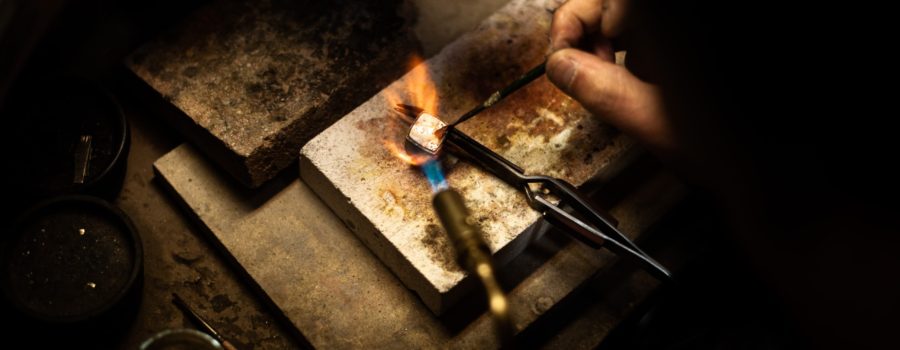This will be the last part of this short series, and my intention is to focus on the dual relationship we Christians have with the ornaments of the bride as represented in the Song of Solomon. We will therefore consider two verses found in this idyllic book which has the potential to inspire us and trigger constructive meditations. The first verse is found in the opening chapter. It reads:
Your cheeks are lovely with ornaments, your neck with chains of gold.” (Song of Solomon 1:10)
These words, expressed by the Bridegroom, refer to the jewelries and necklaces embellishing the bride. Yes! Necklaces. The Scriptures exhort us to wear them, for they can add grace to our neck and beautify us openly. For instance, we read in the Book of Proverbs:
My son, hear the instruction of your father, and do not forsake the law of your mother; for they will be a graceful ornament on your head, and chains about your neck.” (Prov. 1:8,9)
And again:
My son, keep your father’s command, and do not forsake the law of your mother. Bind them continually upon your heart; tie them around your neck.” (Prov. 6:20,21)
Necklaces—in the sense mentioned above—stand for what people apprehend when they look at us. They can be compared to the reputation a person has. Therefore they can be beautiful but also ugly:
“Therefore pride serves as their necklace; violence covers them like a garment.” (Psalm 73:6)
Hence, necklaces have the potential to beautify or uglify us. But here, obviously, we are talking about magnificent pieces of art, carrying in their fiber celestial glory. Consequently, the two verses mentioned above tell us that the person who yields to the instructions of Wisdom will enhance his attractiveness, i.e., His personality will emanate comeliness and grace.
My son, let them not depart from your eyes—keep sound wisdom and discretion; so they will be life to your soul and grace to your neck.” (Prov. 3:21,22)
As much as a stiff-necked person is repulsive, the neck that summits to Wisdom is adorned by the object of its submission and therefore becomes highly inviting.
Let not mercy and truth forsake you; bind them around your neck, write them on the tablet of your heart, and so find favor and high esteem in the sight of God and man.” (Prov. 3:3)
What I am saying is that inasmuch as material necklaces can embellish the person wearing them, their spiritual counterparts can truly and effectively beautify us. This is not mere spiritualizing; it has been experienced in the fabric of society ever since we human came to existence. Yet, the amazing reality is that material beautifiers are on the demands while their spiritual counterparts are neglected at the point of oblivion. This is indeed a deplorable state of affairs.
The other side of the duality
Now we are not only called to wear necklaces and ornaments; we are also called to make them.
We will make you ornaments of gold with studs of silver.” (Song of Solomon 1:10,11)
As we have already seen, in verse ten the Bridegroom is talking to the Shulamite, but in verse eleven it is the daughters of Jerusalem that talk to her. As odd as it may seem, we are called to be the Shulamite in verse ten, but also the daughters of Jerusalem in verse eleven. In Psalm 45 the same idea is developed, we are called to be the royal daughter but also the virgins, her companions:
“The royal daughter is all glorious within the palace; her clothing is woven with gold. 14 She shall be brought to the King in robes of many colors; the virgins, her companions who follow her, shall be brought to You. 15 With gladness and rejoicing they shall be brought; they shall enter the King’s palace.” (Psalm 45:13–15)
The same is true about John 3:29.
The daughters of Jerusalem
In the verse under consideration the daughters of Jerusalem are saying to the bride: “We will make you ornaments of gold with studs of silver” (Song of Solomon 1:11), but since there is unity between morals and aesthetics, we can say: we are called both to edify and beautify our brothers and sisters in Christ. That is right! We must pay attention to ourselves in the realm of aesthetics but also to those belonging to the household of God.
How can we make ornaments of gold?
First of all we need gold. Happily, all of us can buy it: “I advise you to buy from Me gold refined by fire” (Rev. 3:18). Of course this sort of gold is not cheap. The young rich ruler learned it the hard way. That is why many Christians prefer to buy straw or wood. But the one who buys gold will have the material needed to make ornaments as those defined in the Song of Solomon, beautiful artifacts reflecting heavenly radiance.
Secondly, we need taste. Our senses must be exercised to discern both, beauty and ugliness (Heb. 5:14); and since holiness is beautiful (Psalm 29:2) the person acquainted with it will develop a high sense of aesthetics.
Finally, brethren, whatever things are true, whatever things are noble, whatever things are just, whatever things are pure, whatever things are lovely, whatever things are of good report, if there is any virtue and if there is anything praiseworthy—meditate on these things.” (Philippians 4:8)
The person who thus trains himself will reach, without a doubt, an acute sense of beauteousness, an acumen which will enable him to produce ornaments of gold with studs of silver.
And at last, skill is needed; for taste is one thing and artistry another. In this realm God is our only hope. Like Bezalel (Exodus 1:1–5) we need to be filled with the Spirit of God, in wisdom, in understanding, in knowledge, and in all manner of workmanship, to design artistic works of gold to embellish our brothers and sisters in the Lord. As Paul clearly asserts, we are not sufficient of ourselves to think of anything as being from ourselves, but our sufficiency is from God (2 Cor. 3:5). In Him, and in Him alone, lies our hope.
(Photo: Lucio Patone)
If you think this post can help somebody you can share it with one of the options presented bellow.













